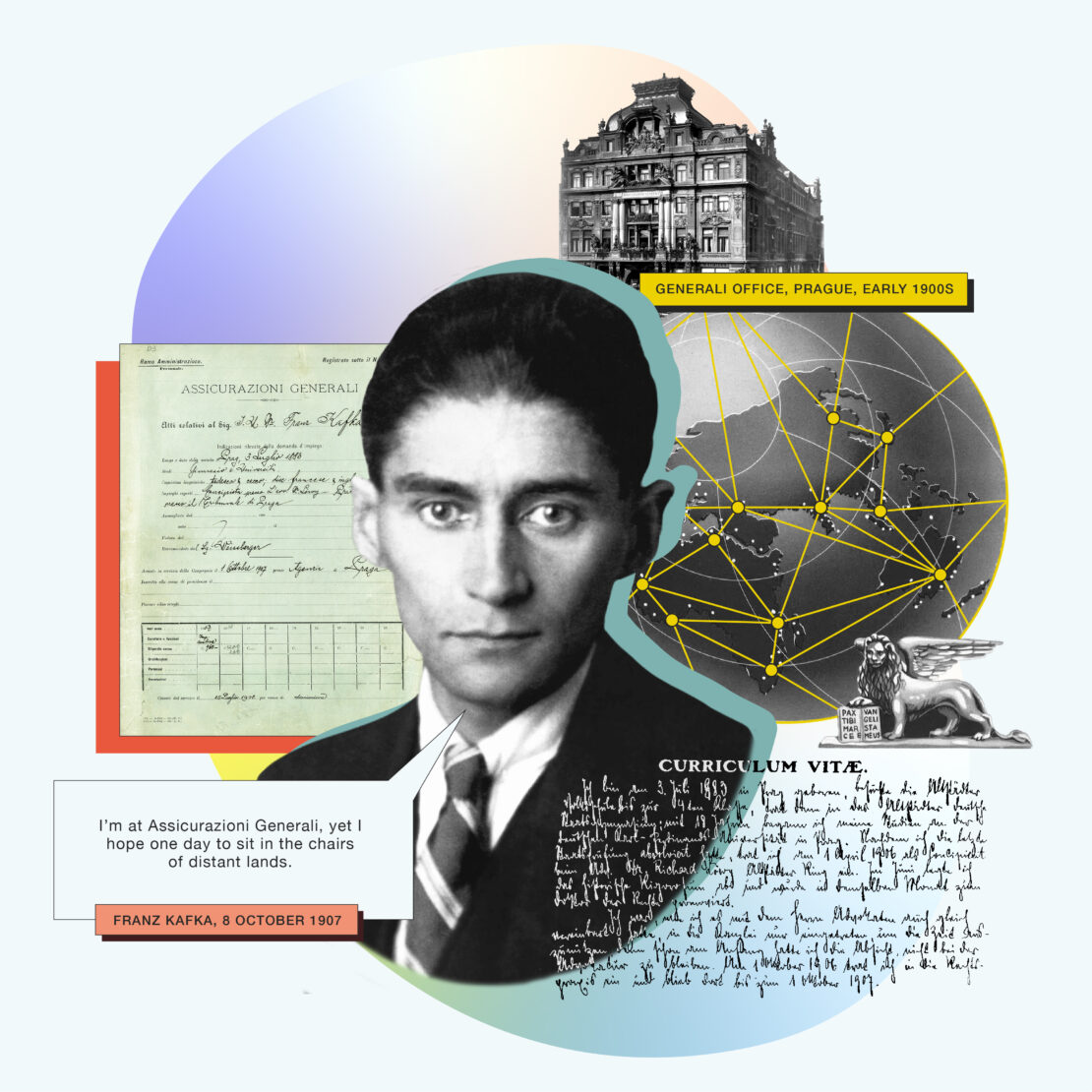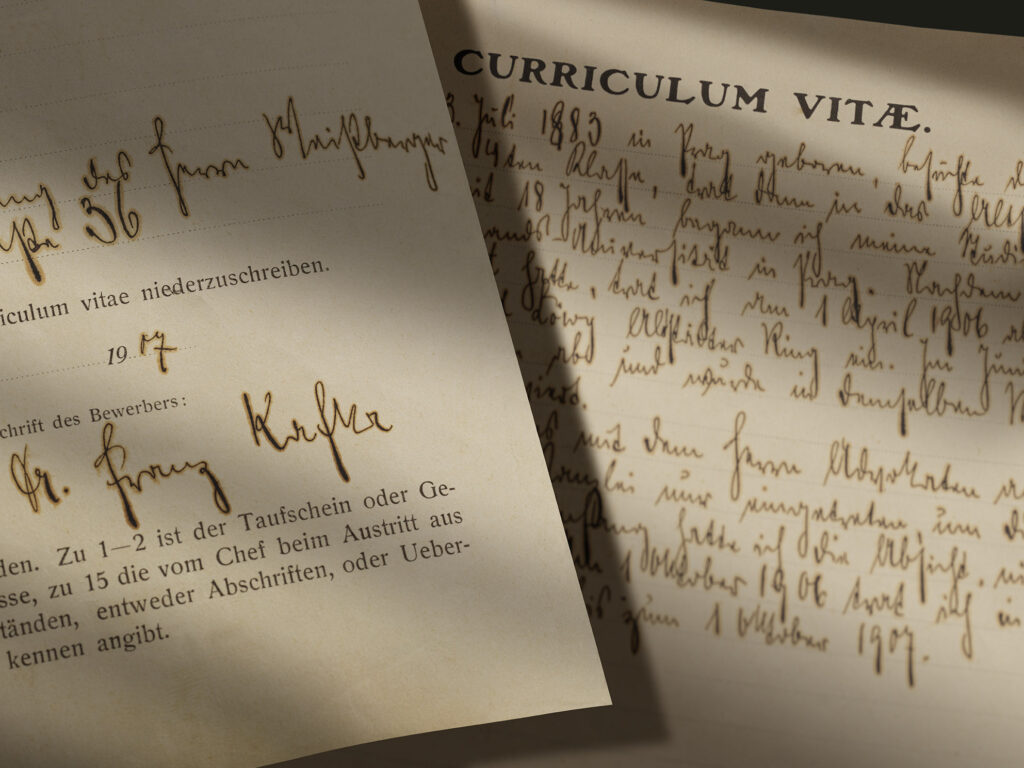1907 – Franz Kafka: Distinguished Clerk at Generali
The 75th anniversary of Generali’s establishment occurred in 1907. In that year, the Group was increasingly global, present on four continents, with numerous agencies, including that of Prague, one of the largest cities of the Habsburg empire. More than 100 employees worked there, including a young law graduate: Franz Kafka.
After graduation and his year in practice, Franz was looking for a job, a decent salary, and reduced working hours to be able to write. His maternal uncle Alfred Löwy knew the Generali representative in Madrid, José A. Weissberger, whose father Arnold, in Prague, was Kafka’s direct reference for a position in the agency, as can be read in his personnel file. Generali still retains Kafka’s application with curriculum vitae and handwritten signature, dated the 2nd of October 1907. On the form, he declared that he spoke German, “Bohemian”, French, and English, while admitting that he was “out of practice” in the last two. He claimed to know German shorthand and to have stayed in Austria and Germany. On the same day, the company’s doctor pronounced him fit to work and the general agency in Prague wrote to Trieste to accept his job application, in the position of auxiliary clerk and with a monthly salary of 80 crowns. At the foot of the page, it is noted: “We intend to instruct Mr. Franz Kafka especially in the Life Branch, in order to also use him in the service abroad, later on.”
Thus, the job gave the writer the hope of travelling, as confirmed by his letters to Hedwig Weiler, his girlfriend at the time. “I am learning Italian because first of all I will probably go to Trieste,” Franz wrote to Hedwig, but he hoped to reach more exotic countries and “look out of the office windows on sugar cane fields or Muslim cemeteries.” Nonetheless, he added: “For the moment my work is sad.”
In fact it was a full-time job, which hindered his writing. What was more, the transfer abroad was slow to arrive. By the end of 1907, the writer was already looking for another job.
“Now my life is in complete disorder,” he wrote to Hedwig. “It is true, I have a job with a tiny salary of 80 crowns and 8-9 interminable hours of work, but I devour the hours outside the office like a fierce beast.”
The end of his relationship with the company was formalised in the letter dated the 14th of July 1908, sent to the Prague agency, in which Kafka’s resignation due to illness was communicated to Trieste.
Generali’s point of view is clear in the response from Trieste, on a slightly worn sheet of paper that closes Kafka’s file. “We express our amazement that the state of health of the aforementioned, who after the careful examination of the doctor carried out in October last year was recommended as absolutely fit, is after such a short time so bad that his immediate resignation must follow.”
For almost all of his short life Kafka earned his living in the insurance field, first at Generali, then at the Workers’ Accident Insurance Institute for the Kingdom of Bohemia, until 1922, the year in which he retired due to precarious health conditions that two years later would bring about his death. In his writings, there is a constant fear that the office will take energy away from his writing. On the other hand, his dedication to work is attested by his career, his accurate technical reports, and the benevolence of his superiors.
As mentioned, in the early twentieth century, Generali was present on four continents and there were nine subsidiaries and associates of the Group. The Head Office in Trieste communicated with the peripheral offices, in a certainly more efficient way than that described by Kafka in the famous story A Message from the Emperor. Knowledge was disseminated according to a network system of people, professions, and skills that was unique in its day.
The development of associates and subsidiaries was, in fact, in line with the expansion trend of “organised capitalism” being formed at the time in Central Europe, but the Generali model – according to Anna Millo’s study – was specific: Generali endowed new companies with human capital and work equipment, with a network governance model constantly travelling between the central and peripheral offices, with internal careers sharing a common profile. Know-how was learned internally and therefore experiences from the peripheral to the central offices and vice versa were formative for careers at Generali, which converged towards a homogenous cosmopolitan, secularised, and liberal profile, accustomed to using German as a lingua franca. As a recent graduate Kafka, destined to be posted abroad, would probably have had a career of this sort.
In 1907, the year he was hired, the number of Generali employees had reached 15,562 people (at the time of its foundation there were 15, rising to 1,276 in 1856 and 6,135 in 1881). Today, it has agencies in 50 countries, around 70,000 employees and over 60 million policyholders. The emblem of its vocation as an operator of complex networks around the world is the Generali Group Academy, which offers excellent technical training and global leadership and talent development programmes, and is a symbol of the interconnection between the countries where Generali works and between these and the “parent company”.

